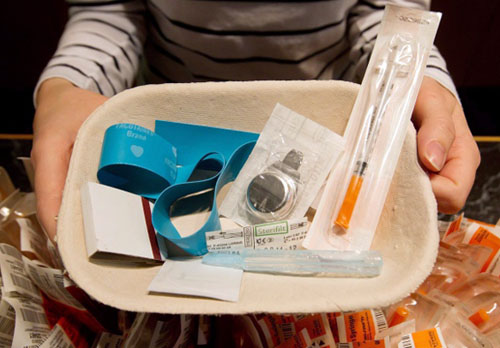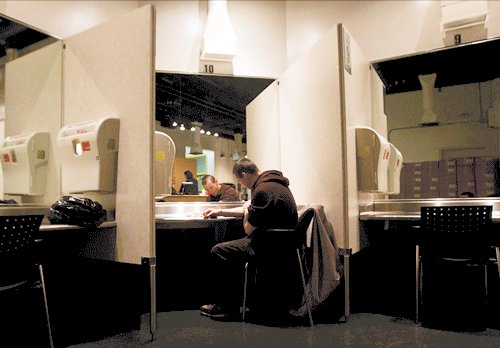Supervised consumption sites in Ottawa: Saving lives and getting drug use off the street
A health crisis in our streets

There’s a growing epidemic in our city. The rate of HIV and hepatitis C among people who use drugs in Ottawa is one of the highest in Canada.
1 in 10 injection drug users are infected with HIV.
6 in 10 have contracted hepatitis C.1
Every day, thousands more are at risk of becoming infected with one of these potentially lethal illnesses.
At least 36 people died from drug overdose in Ottawa last year2 - deaths that could have been prevented.
We must respond to this urgent health crisis.
There's a proven solution
Supervised consumption sites are public health facilities that offer a safe and clean environment where people can use their own drugs under the supervision of trained medical staff.
Opening these sites in Ottawa would:
- reduce the spread of HIV and hepatitis C by providing sterile drug equipment and safe disposal of used needles and pipes
- prevent deaths caused by overdose
- decrease drug use in public and reduce drug equipment litter
- provide access to health and social services, such as first aid treatment and referral to addiction recovery programs
Prevention saves lives and money
The health care costs of treating an HIV infection are around $250,000.3 Preventing the spread of infections leads to a healthier community - and makes fiscal sense.
| Projected cost-effectiveness of a supervised consumption site in Ottawa |
|
|---|---|
| HIV infections averted4 | 10 per year |
| Health care savings from HIV infections averted5 | $2.5 million |
| Hep C infections averted6 | 35 per year |
| Health care savings from hep C infections averted7 | $770,000 |
| Supervised consumption site annual costs8 | $1.5 million |
| Total health care savings from averted infections | $3.2 million |
A cleaner, safer city

Last year, over 6,300 needles and 1,200 crack pipes were recovered from city streets and parks,9 and reports of public drug use in the ByWard Market increased tenfold.10
3 out of 4 drug users in Ottawa say that they would use supervised consumption sites.11 Getting drug use off the street means a cleaner, safer city for everyone.
Providing help when it's needed
Supervised consumption sites would connect people who use drugs with health services that may not otherwise reach them. Clinical staff would provide first aid care, alleviating medical risks. Overdoses would be treated immediately, saving lives. Counsellors would be on-hand to discuss addiction treatment options and refer clients to mental health resources.
- Dr. Mark Tyndall, Head of Infectious Diseases at the Ottawa Hospital12
Insite: A success story

Opened in Vancouver in 2003, Insite is Canada’s first supervised consumption site. It has succeeded in benefiting the health and safety of the community in many ways:
- 35 HIV infections are prevented each year,13 saving $8.7 million in health care costs.14
- Fatal overdoses in the vicinity of Insite have decreased by 35%.15
Not a single person has died of overdose at Insite. - Insite users are 30% more likely to seek addiction treatment.16
458 people entered detox through Insite in 2010.17 - Insite has not lead to an increase in drug use or crime in the area.18
- Gregor Robertson, Mayor of Vancouver19
Who we are
CSCS is a group of community members who advocate for the opening of safer consumption sites in Ottawa for people who use drugs.
We believe that the most effective response to problematic drug use includes harm reduction, expanded social and health care services, preventative measures to address communicable diseases, and evidence-based drug policies.
Contact us at [email protected].
Follow us online on Facebook and Twitter.
Download: ![]() Supervised Consumption Sites in Ottawa - Information Pamphlet
Supervised Consumption Sites in Ottawa - Information Pamphlet
Téléchargez : ![]() Sites de consommation supervisée à Ottawa - brochure d'information
Sites de consommation supervisée à Ottawa - brochure d'information
Sources
- "HIV prevalence was about 11% by both laboratory test and self-report among people who inject drugs in Ottawa. Hepatitis C virus prevalence was 55 to 60% by laboratory test and self-report among people who inject drugs in Ottawa." Report of the Toronto and Ottawa Supervised Consumption Assessment Study, April 11, 2012, pages 231-232
- "Rob Boyd, director of the Oasis Program at the Sandy Hill Community Centre, says data from the Ottawa Paramedics show that over the last three years, first responders consistently attended about three overdose calls a day. Over a 12 month span, he says there were 36 overdose deaths in Ottawa." 580 CFRA, April 16, 2012. Supported by reports from the Office of the Chief Coroner for Ontario.
- "We estimate that the net present value of treating individuals with new HIV infections will be about $768,100,000 over their remaining lifetimes (or $250,000 per person)." Canadian AIDS Society, The Economic Cost of HIV/AIDS in Canada, November 24, 2011, page 12
- "We project the first facility would be associated with about 10 averted HIV infections per year." Report of the Toronto and Ottawa Supervised Consumption Assessment Study, April 11, 2012, page 241
- Based on estimates of 10 HIV infections averted per year multiplied by lifetime health care costs of $250,000 per person.
- "We project the first facility would be associated with about 35 averted hepatitis C virus infections per year." Report of the Toronto and Ottawa Supervised Consumption Assessment Study, April 11, 2012, page 242
- "The estimated lifetime discounted cost of treating someone with hepatitis C infection is $15,000 to $30,000." Report of the Toronto and Ottawa Supervised Consumption Assessment Study, April 11, 2012, page 244. Based on estimates of 35 HCV infections averted per year multiplied by an average health care cost of $22,000 per infection.
- "The total operating costs of establishing multiple sites is then the sum of the fixed cost of $1,440,000 multiplied by the total number of sites established and the per-client cost of $125 multiplied by the total number of clients served." Report of the Toronto and Ottawa Supervised Consumption Assessment Study, April 11, 2012, page 312
- "The Needle Hunters are a group of people who proactively search for and dispose of these items in priority neighbourhoods across the City. In 2011, the Needle Hunters recovered 6,349 needles and 1,271 crack pipes." City of Ottawa website, What Is Being Done About Discarded Needles In Our Communities?, accessed on July 30, 2012
- Based on 4 instances of public drug use observed by the ByWard Market Ambassador Program during summer 2010, versus 44 instances observed during summer 2011. ByWard Market Ambassador Program, Final Report Summer 2011, May 28, 2012, page 21
- "Overall, 74% of people who inject and smoke drugs reported that they would use a supervised injection facility." Report of the Toronto and Ottawa Supervised Consumption Assessment Study, April 11, 2012, page 155
- Dr. Mark Tyndall, Why Ottawa needs some Insite, Ottawa Citizen, October 4, 2011
- "Through the use of conservative estimates, Vancouver's SIF, Insite, on average, prevents 35 new cases of HIV and almost 3 deaths each year." M. Andresen, N. Boyd, A cost-benefit and cost-effectiveness analysis of Vancouver's supervised injection facility, International Journal of Drug Policy, January 2010, pages 70–76
- Based on 35 HIV infections averted per year multiplied by lifetime health care costs of $250,000 per person.
- "Overdose mortality was reduced after the opening of a SIF. Reductions in overdose rates were most evident within the close vicinity of the facility—a 35% reduction in mortality was noted within 500 m of the facility after its opening." Reduction in overdose mortality after the opening of North America’s first medically supervised safer injecting facility: a retrospective population-based study, April 2011, page 6
- "The SIF’s opening was associated independently with a 30% increase in detoxification service use, and this behaviour was associated with increased rates of long-term addiction treatment initiation and reduced injecting at the SIF" Rate of detoxification service use and its impact among a cohort of supervised injecting facility users, June 2007, page 1
- "From January 1 to December 31, 2010, there were 458 admissions to OnSite detox" Vancouver Coastal Health website, Supervised injection site user statistics, accessed on July 30, 2012
- "The presence of Insite did not contribute to increased crime rates, increased incidents of public injection, or relapse rates in injection drug users. On the contrary, Insite was perceived favourably or neutrally by the public; a local business association reported a reduction in crime during the period Insite was operating; the facility encouraged clients to seek counselling, detoxification and treatment." Judgement of the Supreme Court of Canada, Canada (Attorney General) v. PHS Community Services Society, 2011 SCC 44, [2011] 3 S.C.R. 134, September 2011
- Gregor Robertson, B.C. court affirms injection site's right to exist, CBC News, January 15, 2010


